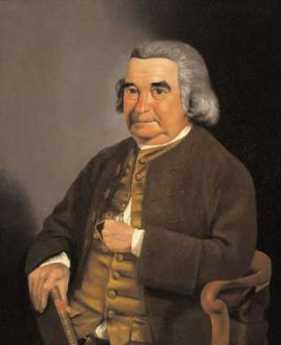Related Topics
Quakers: All Alike, All Different
Quaker doctrines emerge from the stories they tell about each other.
Revolutionary Philadelphia's Patriots
All kinds of people were patriots in 1776, and many of them were all mixed up about what was going on and how they stood. Hotheads in the London Coffee House stirred up about an inoffensive Tea Act, Scotch-Irish come here to escape the British Crown, the local artisan class and the local smuggler class, unexpectedly prospering under non-importation, and the local gentry -- offended to be denied seats in Parliament like other Englishmen. Pennsylvania wavered until Ben Franklin stepped forward with a plan.
Causes of the American Revolution
Britain and its colonies had outgrown Eighteenth Century techniques of governance. Unfortunately, both England and America lacked the sophistication to make drastic changes smoothly.
Slavery and Quakerism
Quakers wanted to free their own slaves peacefully; Bostonians wanted to abolish slavery, punish slaveholders.
Differences of Quaker Opinion
A reader of Philadelphia Reflections feels that a balanced appraisal of the slavery issue should include mention of the Quakers who were determined in their opposition to abolition. After all, it took eighty years for the original concern of the Germantown meeting to be fully adopted by the Philadelphia Yearly meeting as a formal minute under the prodding of John Woolman. Since the minute gives permission for particularly concerned Friends to go speak with slave-holding Quakers, it is clear that even some Philadelphia Quakers held slaves and were reluctant to release them.
| ||
| Abraham Redwood 1709-1788 |
Newport, Rhode Island, was an even more awkward case. In colonial times, and even today to some degree, individual Yearly meetings were cordial, but under no formal obligation to respond to each other's decisions. The English seaport of Bristol had developed a sugar trade with the West Indies, and a number of Bristol Quakers moved to Newport. Acquiring very large sugar plantations in the Indies, they shipped molasses to rum distilleries in Newport or else directly back to Bristol where a candy industry had been established. The next step was the shipment of rum and/or trading trinkets to Africa, to be exchanged for slaves, who were taken to the Caribbean and exchanged for a cargo of molasses. Molasses then went to Newport, in a triangular trade pattern which admittedly avoided bringing slave cargo to Rhode Island, but whose principal purpose was taking advantage of the prevailing Atlantic trade winds while maintaining a full cargo over the whole distance. The largest partnership in this trade belonged to four Newport Quakers, one of whom was Abraham Redwood.
Redwood owned 230 slaves in Antigua and was among the richest men in America at the time. It is rather troubling to learn that the average "turnover" of slaves on Antigua was seven years, and that slave rebellions were fairly common. Redwood donated five hundred pounds to the Newport Philosophical Society for the purchase of 1300 books, thereby establishing the Redwood Library in 1747, one of the oldest in the country, although the Library Company of Philadelphia was established in 1731. By almost any standard, Redwood was nevertheless a "weighty" Quaker. When he resolutely refused to sell his slaves, he was "read out" of the meeting.
Details of the discussions which were conducted are no longer readily available, but it is obvious that collision of these two equally stubborn viewpoints was particularly awkward when it led to the banishment of the main employer of the town, and its most important local benefactor. Furthermore, those who worked harmlessly in the rum industry in Newport, or the candy industry in England, were called upon to reflect deeply on the unfortunate slave dealings in which they were, perhaps unknowingly, implicated.
Somehow all of this was accomplished without a total rupture, because thirteen years later Abraham Redwood donated another five hundred pounds to the Quaker Meeting, for the establishment of a school.
Originally published: Saturday, July 29, 2006; most-recently modified: Thursday, May 16, 2019
